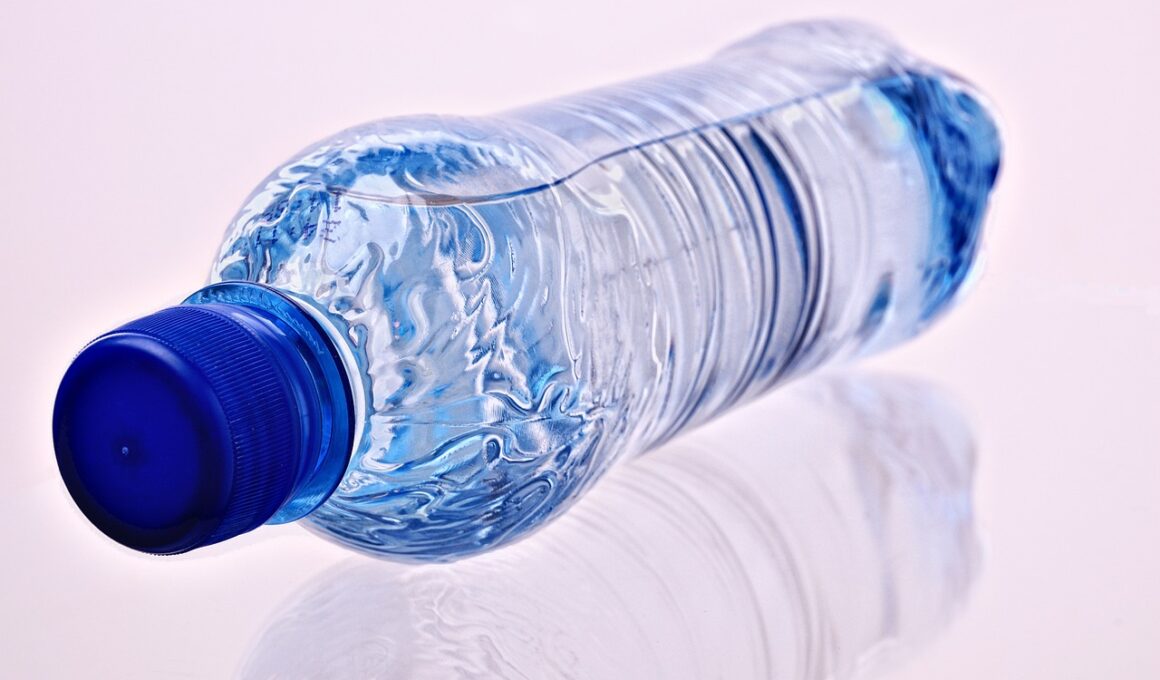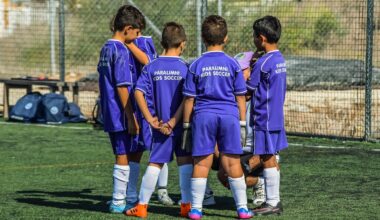Hydration Myths That May Impact Your Game
Hydration is crucial for athletes, yet various myths surrounding it can mislead and hinder performance. A common belief is that thirst is sufficient indication of hydration needs. While feeling thirsty signals a need for fluids, it often occurs when dehydration has already set in. Athletes must preemptively hydrate. Additionally, some think that all drinks are equally effective for hydration. In reality, water is the best choice, while beverages high in sugar or caffeine can exacerbate dehydration. Also, athletes often believe they can hydrate adequately just before an event. However, optimal hydration should occur well in advance. Strategies like consistently drinking water throughout the day are essential for maintaining performance levels. Moreover, excessive water consumption is deemed healthy by some, yet overhydration can lead to water intoxication, which disrupts electrolyte balance. It’s crucial for athletes to understand the balance between hydration and overhydration to enhance performance and prevent health issues. Athletes should also remember that hydration needs vary depending on factors like temperature, exertion, and personal sweat rates. Lastly, a diet rich in hydrating foods can aid overall hydration as well.
An additional myth suggests that electrolyte drinks are essential for all athletes. While it’s true that they are beneficial during intense or prolonged activities, many athletes can maintain adequate hydration by simply drinking water. Electrolyte drinks can sometimes contain excessive sugar or artificial ingredients that can be counterproductive. Athletes should consider their specific activity and duration to determine hydration needs. For shorter training sessions, plain water is often sufficient. Moreover, some athletes think they can rely solely on thirst to gauge their hydration. This can be misleading, especially during intense workouts when dehydration can occur before thirst is felt. Thus, establishing a consistent hydration plan is important. Another misconception is that only fluid intake matters, ignoring the importance of food. Consuming fruits and vegetables can contribute significantly to hydration levels. Foods like cucumbers, oranges, and strawberries offer both hydration and essential nutrients. Furthermore, many believe that cold drinks are better for hydration. While they might feel refreshing, there is no substantial evidence to suggest that cold beverages hydrate better than room temperature options. Athletes should focus on overall hydration rather than the temperature of their drinks to maximize their performance.
The Role of Timing in Hydration
Timing is crucial for effective hydration, a fact often overlooked by athletes. Many believe that drinking water during a workout is adequate, but pre-hydration plays an equally vital role. Hydrating prior to exercise helps maintain performance and prevent dehydration. A good rule of thumb is to start hydrating the day before an event, ensuring adequate fluid levels are established. Additionally, athletes should not only consider what they drink but also how much. Consuming around 500-700 mL of fluids about two hours before exercise can help optimize hydration and performance. During activity, sipping water at regular intervals rather than gulping large amounts can aid in absorption and minimize gastrointestinal discomfort. Post-exercise, athletes often underestimate the need to replenish lost fluids. Studies indicate that athletes can lose significant fluid during workouts, and replacing this loss is essential for recovery. Monitoring urine color can help gauge hydration status—light yellow indicates proper hydration while darker shades suggest the need for more fluids. Proper hydration timing can significantly impact both athletic performance and recovery, making it an important consideration for serious athletes.
Next, many athletes fall into the trap of believing that coffee or caffeinated drinks contribute to dehydration. This is not entirely accurate. While caffeine has mild diuretic properties, the amount consumed in moderation is less likely to lead to dehydration than previously thought. In fact, some evidence indicates that caffeine can enhance performance during endurance events. Furthermore, athletes often assume that all sports drinks are equal. However, not all drinks offer the same benefits. Products high in sugar can actually hinder performance and hydration, while those specifically formulated for athletes can enhance endurance. Price does not guarantee quality, so athletes should read labels carefully. Some believe that water is the only method of hydration available, neglecting low-calorie options like flavored waters or herbal teas that can provide variety without the negative effects of sugar. Moreover, athletes often fail to recognize the effects of temperature and climate on hydration needs. Exercising in heat increases fluid loss, requiring adjustments to hydration strategies. Adaptability is key in ensuring athletes meet hydration requirements. Pay attention to individual sweat rates and adjust fluid intake to maintain optimal hydration levels necessary for peak performance.
Hydration During Recovery
A common misconception is that athletes should only focus on hydration during training or competition. Recovery hydration is equally vital for restoring lost fluids and preventing fatigue. After exertion, the body’s need for replenishment increases, yet many athletes neglect this aspect. Drinking water or electrolyte-replenishing beverages immediately after workouts can enhance recovery and improve subsequent performance. Additionally, some athletes believe that the volume of fluid is all that matters, but it’s important to consider the quality of those fluids as well. Opting for drinks low in sugar and artificial additives can promote better recovery. Another prevalent myth is that hydration isn’t necessary during rest days. While not exercising at high intensity, athletes still lose fluids through daily activities, and staying hydrated supports overall bodily functions. Incorporating fluid intake during meals and snacks can also be an effective strategy. Another aspect to consider is the environment. During cold weather, athletes may forget to hydrate, mistakenly believing they don’t need fluids. Yet, dehydration can occur in any climate. Including hydration habits in daily routines promotes better performance and health, enhancing both training and recovery periods.
It’s also critical to dispel the myth that juvenile athletes should follow the same hydration strategies as adults. Young athletes often have higher fluid needs relative to their body size due to elevated metabolic rates and higher surface area. They should be educated about hydration from an early age to form healthy habits. Furthermore, some adults might think they need significantly more fluids as they age, while the body’s requirements may not change as drastically as perceived. It’s essential to listen to the body as needs can vary, such as during illness or heat exposure. Another myth involves fake hydration methods, like soaking in cold baths, which do not adequately hydrate the body. Hydration must come from internal fluid replenishment rather than external sources. Athletes also may think they are doing fine by only monitoring weight changes after workouts, but proper hydration involves proactive measures to prevent weight loss rather than reactive ones. Athletes must be consistently informed about their fluid needs to maintain performance. Consequently, discussions around hydration should focus on evidence-based strategies rather than misconceptions to foster high performance and health across the athletic community.
Conclusion on Hydration Myths
In conclusion, hydration is often surrounded by numerous myths that can mislead athletes and potentially impact their performance negatively. Understanding the truths behind hydration, such as the timing, importance of quality fluids, and individual needs based on activity level, is vital for optimal athletic performance. Athletes should prioritize regular fluid intake and monitor their hydration status actively. Integrating hydration strategies into daily routines ensures that athletes are well-prepared before, during, and after training or competition. As misconceptions persist, it is essential for athletes to seek accurate information and remain educated. Coaches, trainers, and sports nutritionists play crucial roles in guiding athletes toward sound hydration practices. Promoting the consumption of hydrating foods along with water can add a vital element to hydration strategies. Remember that hydration needs change with conditions, including heat, stress, and personal activity levels. Ultimately, breaking down hydration myths will contribute to improved performance, better recovery, and enhanced overall well-being in athletes. As awareness spreads, athletes can enjoy the benefits of proper hydration strategies for successful and enduring athletic careers.


